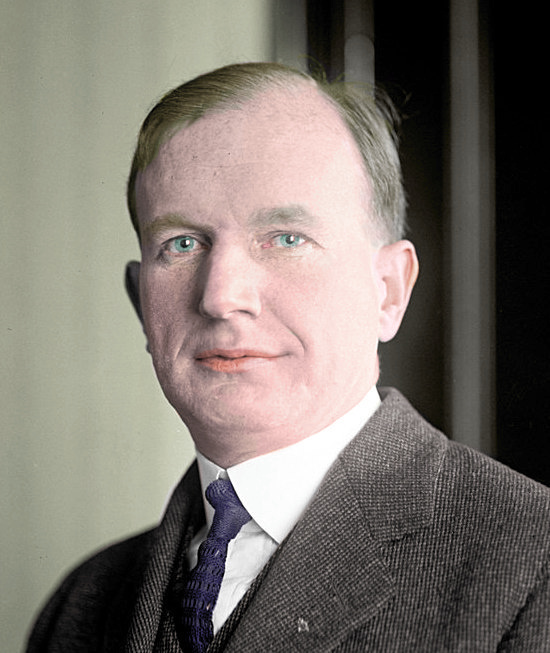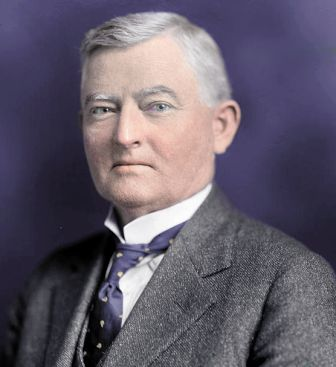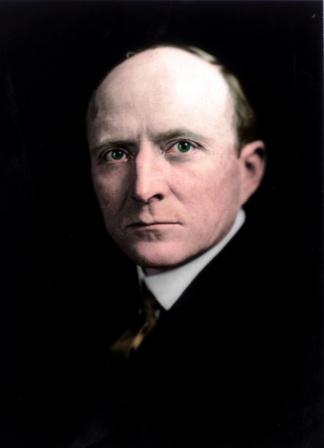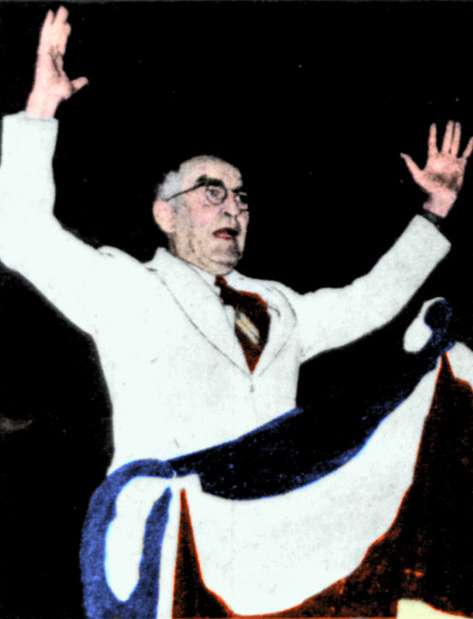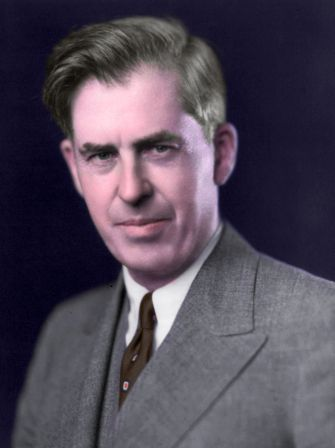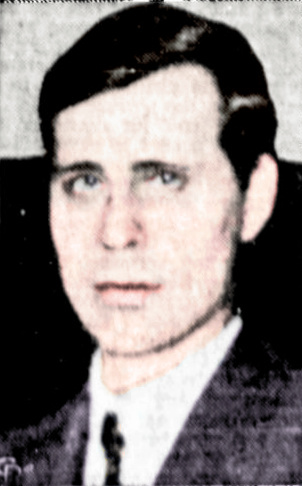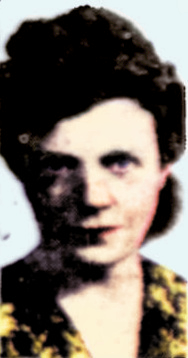
DISCLAIMER:
Indy talked about the results of this convention back in Ep. 47 - Good People on Both Sides? (7-20-40) - here’s the entire story of what happened at the convention itself.
This collection of posts is made in the context of the times (spot the differences in writing style). I also included the Democratic Party Platform of 1940 in its entirety not only for the sake of immersion, but also to help understand the political goals and ambitions of the Democrats at the time. I used newspaper reports from Jul 1940 to tell the story (Hint - read the last news article for the “other reason”). I will also be adding a few more pictures and articles in this post to spice it up a bit, so expect a lot of edits.
I will post the collage and a few pictures later because I’m still busy with the rest of my colorization work.
Just like with the RNC, members of the TimeGhost Army and others could easily take the time to read through the entire thing and hopefully create further understanding of the situation among the Democrats in a world at war.
With the Republicans, the question for America was “To be or not to be”.
For the Democrats, the question for America is:
Oh, who will be the nominee?
The question baffles all;
Will it be Franklin or F. D.?
Will Roosevelt get the call?May Frank D. R. become the choice,
Or Hyde Park’s favorite son?
Will Groton heed the People’s voice?
Will Harvard make the run?Oh, will he wear a sailor hat?
Or will the nominee
Be Father of the Fireside Chat?
It’s such a mystery!
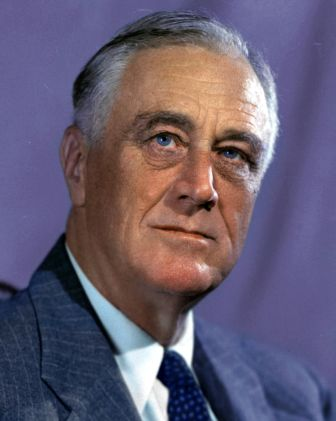
Venue: Chicago Stadium, Chicago, Illinois.
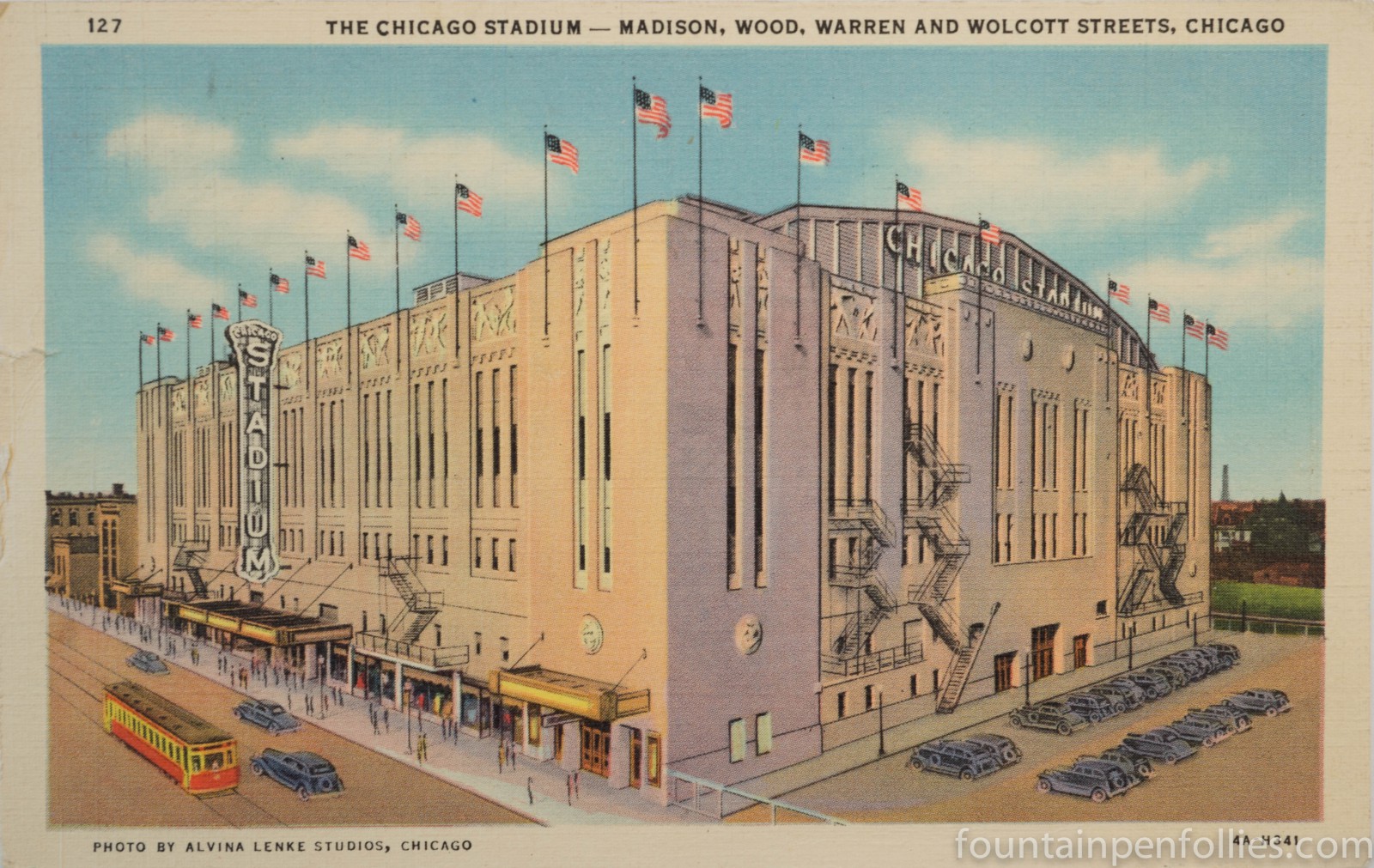
The candidates:
Collage coming soon…
Chairman of the Democratic National Committee:
Postmaster General James Aloysius Farley (NY)
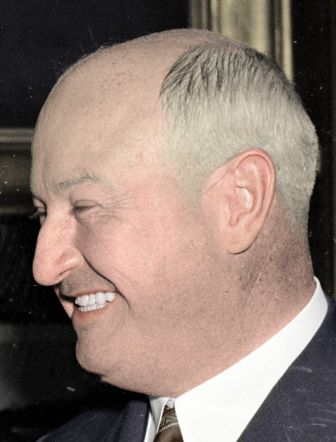
Sarasota Herald-Tribune (July 14, 1940)
The Democratic Convention
The middle of the stage will be occupied this week by the Democratic Convention in Chicago. Unless Franklin D. Roosevelt puts a crimp in its deliberations by refusing to accept the nomination for a third term, everything is cut and dried and the convention will roll along smoothly. However, should FDR refuse the nomination for a third term, the floodgates will be opened and the convention will be deluged with aspirants for the nomination. The Democratic Party is not suffering from a shortage of men well qualified for the position. If the President chooses to select the candidate, he can probably name the man, but if he keeps his hands off, no one is qualified to state with any assurance who the nominee will be. The refusal of FDR to take the country into his confidence and tell the public his decision, as to whether or not he would accept the nomination, has certainly invested the convention with an element of confusion.
The nomination of Wendell L. Willkie by the Republicans, in response to a very general demand, has created a somewhat more strenuous situation for the Democrats. Willkie is undoubtedly the strongest man the Republicans could have nominated. It is generally recognized by leading Democratic politicians that he is going to be a hard man to beat and many of them feel that the only Democrat who can beat him is the present occupant of the White House. A recent Gallup poll shows that Roosevelt today would get 53% and Willkie 47% of the popular vote. The poll shows that 10% of the voters interviewed were uncertain as to how they would cast their vote.
There will be no lack of enthusiasm in the Democratic Convention in Chicago. The Roosevelt administration has provided a good background for the party in the conduct of the campaign. There is lots of fuel for fiery speeches which will stir the enthusiasm of the members of the party. The platform will provide the issue upon which the party will go before the electorate. The probability is that the President will be nominated and he himself will supply the platform. Unless we misjudge the situation in American politics today, the coming campaign is going to be one of the hottest and one of the most stubbornly contested in recent years.
Lewiston Evening Journal (July 15, 1940)
CONVENTION PROGRAM
Chicago (AP) –Here is the program for the Democratic National Convention:
Today
- Call to order at 11 a.m. (CST) by National Chairman James A. Farley.
- Invocation by Archbishop Samuel Stritch of Chicago.
- The national anthem, sung by Phil Regan, tenor.
- Welcome by Mayor Edward J. Kelly of Chicago and Senator Scott Lucas of Illinois.
- Routine business.
- Recess until 8 p.m.
- Invocation by Methodist bishop Ernest Lynn Waldorf.
- The national anthem.
- Address by Chairman Farley.
- Keynote address by Speaker William B. Bankhead.
- “God Bless America”, sung by Harry Richman.
Tuesday
- Adoption of rules and appointment of committees (11 a.m.)
- Address by Rep. Arthur Mitchell of Illinois.
- Address by Senator Alben W. Barkley of Kentucky, Permanent Convention Chairman (8 p.m.)
Wednesday
- Addresses by Senator James F. Byrnes of South Carolina and Homer Mat Adams of Illinois, president of the Young Democratic clubs (11 a.m.)
- Adoption of platform (8 p.m.)
Thursday
Selection of nominee for President and Vice President.
KELLY CALLS ON DEMOCRATS TO DRAFT ROOSEVELT
…
Sen. Lucas Also Urges Draft to Defend Liberty
…
Chicago (AP) –
A demand that Franklin D. Roosevelt be drafted for a third term because he is “the kind of man that mankind needs” was sounded during the first hour of the Democratic National Convention today by Mayor Edward J. Kelly.
The mayor turned his scheduled “welcoming speech” into a “draft Roosevelt” demand as delegates listened thru nearly an hour of speeches and formalities which started the convention toward a presidential nomination.
“The salvation of this nation rests in one man because of his great experience and sincere humanitarian thinking,” Kelly said.
That is why I am praying that this great Democratic Convention, with the eyes of an unhappy world upon it, will stand with all unity.
Only a few minutes before, the President had talked with Chairman James A. Farley by telephone from the White House to wish him a successful convention and ask “how are things going?”
Farley’s response was “okay.”
“We Want Roosevelt!”
A burst of applause greeted Kelly’s “draft” speech but Farley cut the demonstration short with his gavel.
A burst of applause ran over the hall when Farley came to the speaker’s stand and rapped with his gavel. From high in the gallery rang a single shout:
We want Roosevelt!
Farley’s grin spread as the big organ playing “Take Me Out to the Ball Game” – “One, Two, Three Strikes, You’re Out. That’s the Old Ball Game.” The song recalled recent reports that Farley might soon take a position with the New York Yankees.
The convention was declared in order at five minutes after 11:05 a.m. (CST) and Farley presented Archbishop Samuel A. Stritch of Chicago who prayed for a “rededication to the tasks of upholding under all circumstances our free institutions.”
“Let justice prevail in us,” the Archbishop said. “May our country of free men over be a beacon light to all the world.”
Phil Regan, Irish tenor, sang the Star Spangled Banner and received a big cheer when he had finished.
L. W. Robert Jr., Secretary of the National Committee, then read the formal “call for the convention.”
Few were listening. A loud buzz of conversation arose from the floor, and the aisles were a confusion.
Kelly
Mayor Edward J. Kelly of Chicago beamed when Farley presented him to welcome the delegates.
Kelly delivered what turned into a “draft Roosevelt” address which brought cheers from the delegates on the floor and started New York’s banner up the center aisle.
“Chicago has done its best to ward off any telegraphing bombardment from Wall Street,” Kelly said, perspiring under brilliant lights.
The delegates, he continues, would find in Chicago a people opposed to “selling humanity in the open market.”
“We can smell organized propaganda before the poison ink is dry,” Kelly said.
We in Chicago will always defend our personal liberty and our free institutions with everything we have.
The only dictatorship we will ever accept is that of the people.
Each Presidential candidate has the stamina and vision to carry the Democratic Party to victory. We are praying and hoping that the man who can keep the White House as the lighthouse for humanity will accept the crushing burden for the next four years.
I think I know that the President of the United States has no wish to labor under the burden of this office. He has discouraged every attempt I have made to have him become a candidate. He is not a candidate. But we must draft Roosevelt.
We will stand and confirm again and again that God-sent guardian of our liberties, the kind of man our country needs, our beloved President, Franklin D. Roosevelt.
Lucas
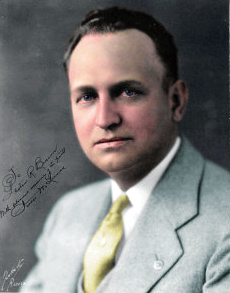
Scott Lucas, 48, Senator from Illinois.
When Farley had restored order, he presented Senator Scott Lucas, who came to extend the welcome of Governor Henry Horner of Illinois, who is ill.
Recalling that it was “under this very roof” that the party first nominated “the man who is today our far-seeing, gallant and inspiring national leader, the President of the United States, Franklin D. Roosevelt,” Lucas said:
I am confident that this convention will not only meet the high hopes of the people of Illinois and of America, but all liberty-loving people throughout the world will be heartened and encouraged to know that democracy in America, described by Lincoln as ‘the last best hope on earth,’ continues to reign supreme.
At the behest of Farley, a minute’s standing tribute was accorded to the late Senator Joseph T. Robinson of Arkansas, who was chairman of the 1936 convention, and the late W. Forbes Morgan of New York, treasurer of the party.
Farley then presented Mrs. James Hamilton Lewis, widow of the late Senator from Illinois, who bowed briefly.
Recess Until 8 P.M.
Robert J. Dunham, chairman of the Chicago Citizens Committee, made another speech of welcome and then the convention, after a 45-minute session, recessed until 8 p.m. (CST).
Shortly before Chairman James A. Farley banged the gavel which tore he wrappings from the opening session, he had reiterated that his own name would be placed before the convention.
Fisher to Nominate Farley
His nominating speech will be made by Raymond M. Fisher of Nanuet, N.Y., who succeeded Farley as chairman of the Rockland County Democratic Committee in 1929, in the event that acid-tongued Senator Glass of Virginia, detained in Washington by his wife’s illness, is unable to reach Chicago.
In a press conference shortly before he called the delegates to order, Farley voiced the opinion that dominates this convention’s atmosphere. He was asked:
Do you anticipate that before the results of the first ballot are announced, the nomination will be unanimous?
“I think so, yes,” replied the Postmaster General.
In further explanation of the procedure leading to Mr. Roosevelt’s generally-accepted renomination, Farley said that the delegates should have “an opportunity to express their viewpoint” on a state-by-state roll call. But as in most national conventions, as soon as a numerical majority had been rolled up for one man – in this case Roosevelt – the delegates who had supported others would switch their support so that the clerk could announce a unanimous nomination.
Not Releasing Delegates
For his part, Farley said he favored making the nomination unanimous. He made clear, however, that he was not releasing his own delegates prior to that first roll call, and did not attempt to speak for other contenders such as Senator Wheeler of Montana, Vice President Garner and Paul V. McNutt of Indiana.
“The Massachusetts delegation is pledge to me,” Farley told reporters in a big hotel ballroom.
I certainly am not going to ask anybody to vote for me in this convention or to do anything for me that they do not feel free to do. If the members of the Massachusetts delegation don’t feel that their pledge is binding, that is up to them to determine.
If the delegates release themselves, that is up to the delegates.
In reply to another question relating to possible support in the New York delegation, Farley said:
I won’t ask anybody from New York to do anything.
The general belief that the President would run left speculation free to roam through vice presidential possibilities and into the field of foreign affairs, where there still was no certainty that an argument might not develop.
Here the name of Secretary Hull rose into high prominence. Many said he would be the man to whom Mr. Roosevelt might turn as his running mate. They based this belief on the European war crisis and the efforts of Mr. Roosevelt to develop a hemispheric solidarity.
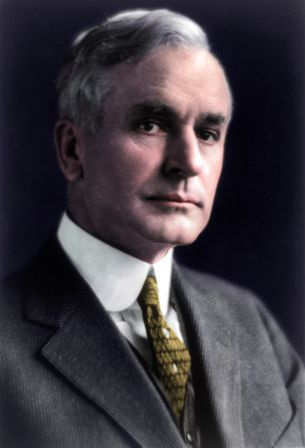
Cordell Hull, 68, Secretary of State.
Secretary Hull has had more to do with the development of the “good neighbor” policy with Latin America than most of the others in the administration. He traveled to several Pan American conferences, and will attend one in Havana Saturday.
Token of “Good Neighbor”
Those booming Hull for the Vice Presidency argued that his nomination would be a token to Latin America that the “good neighbor” policy would be continued by the Democrats.
Still others were arguing, however, that for the sake of party solidarity, Vice President Garner should be renominated.
But the town was filled with potential vice presidential candidates.
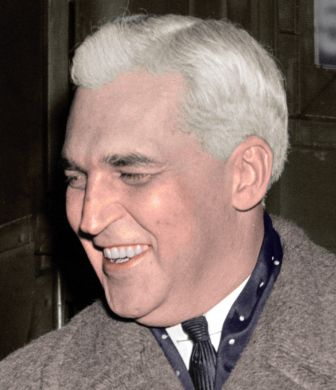
Paul V. McNutt, 49, Federal Security Administrator.
Paul V. McNutt of Indiana, Federal Security Administrator, wandered among the plush furnishings of a palatial hotel suite shaking hands with all comers. He has withdrawn from the presidential race unless Mr. Roosevelt renounces another nomination.
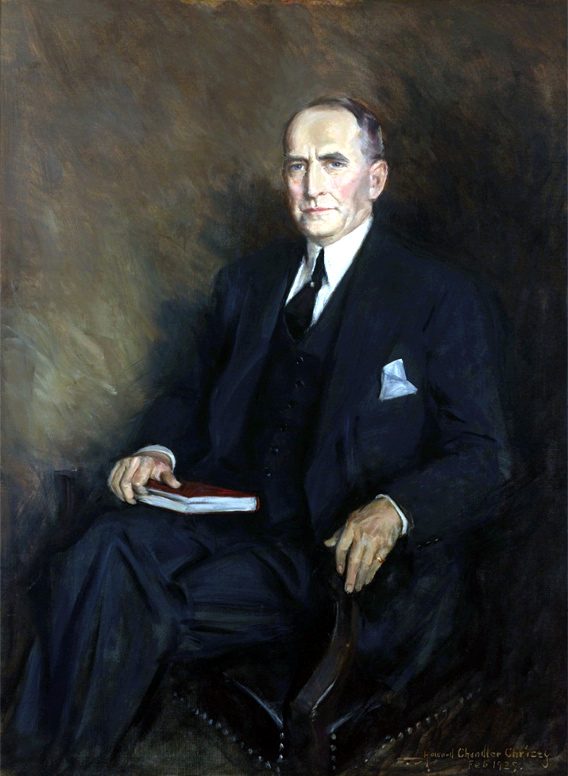
William B. Bankhead, 66, Speaker of the House of Representatives.
Speaker Bankhead held a press conference. So did Chairman Farley. Senator Byrnes of South Carolina was in evidence. Jesse H. Jones of Texas, who runs the lending agencies of the federal government, was here. So was Representative Rayburn of Texas, and the House Floor Leader, who, like Jones, is a close friend of Garner.
Wheeler Out of Contest
Of this group, only Senator Wheeler of Montana – like Garner and Farley, a presidential aspirant – removed himself from the vice presidential race. Wheeler said he would rather be Senator than doze away his time with a gavel in his hand.
He was devoting much of his energy to obtaining a strong “non-intervention” foreign policy plank in the party platform. Early today, he reached an agreement with four other senators on a declaration which they planned to submit to the Resolutions Committee.
The plank, which the group announced would be made the subject of a floor fight if necessary, would pledge the party never to use the nation’s armed forces for aggression or to engage in wars in Europe or Asia.
The four who joined with Wheeler were Senators Clark of Missouri, Clark of Idaho, McCarran of Nevada and Johnson of Colorado.
On the third term question, close friends of the President said he had not expressed himself to them except to say “I am not a candidate.” But such men as Secretary Ickes said they had no doubt he would take the nomination.
Yet, bereft of the counsel of Chairman Farley, the strategists of the third term drive were said to be somewhat uncertain whether to put Mr. Roosevelt’s name in nomination or simply to let the votes flutter to his standard when the polling starts Thursday, without the formality of a nominating speech.
The Day (July 15, 1940)
Green Asks Democratic Plank Safeguard Labor Standards
Chicago (AP) –
William Green, president of the American Federation of Labor, asked Democratic Convention platform drafters today to safeguard labor standards in the national defense program.
Demanding that organized labor be given a voice in the formulation of defense policies affecting workers, Green said:
Minimum wage, maximum hour and social legislation standards must not be lowered.
The labor chief also called for prosecution of subversive elements. He declared that organizations “inspired, supported and financed by Communist and Fascist groups” were carrying on activities “subversive to the American form of government.”
Anti-Trust Laws
In addition, Green proposed a platform declaration against use of anti-trust laws to prosecute labor unions. On the subject of unemployment, he suggested that the 1940 Democratic Convention take a stand in favor of a permanent public works program and RFC insurance of private long term loans “to facilitate the flow of private investments”. “Impartial admission” of the Wagner Labor Act was also asked.
L. W. Robert, Secretary of the Democratic National Committee, urged the Resolutions Committee to incorporate a plank expressing confidence in the foreign-born part of the population of this country and their first generation descendants.
He asserted that since the outbreak of the European war, growing suspicion had been “unfairly” directed against foreign-born residents.
Would Stop Immigration
Another to speak before the committee was Senator Reynolds (D-NC), who advocated a program which included a demand for suspension of all immigration for permanent residence here until all persons now on relief and capable of absorption into private industry became self-supporting.
He also asked for a ban on government purchase of foreign silver and said further that the national interest demanded that Congress make unlawful the purchase of gold from Germany or Russia or from countries under their domination.
He recommended another plank calling for the outlawing of the Communist Party, the German-American Bund or any political organization controlled or subsidized by any foreign government or which advocates overthrow of the government.
Roosevelt Has Direct Wire To Chicago
Washington (AP) –
The White House is connected with Chicago now by a direct telephone wire, but Presidential Secretary Stephen Early assorted today it “has not been used” so far.
Early disclosed the telephone connection in talking with reporters at the start of a history-making week in which political leaders believed President Roosevelt would accept renomination by the Democratic Party and thus challenge the tradition against any man serving three terms in the White House.
The Democratic National Committee is paying for the wire, Early declared, adding that if the President or anyone in the White House used it, he would get an operator in the convention city, as the wire was not connected directly with anyone’s room.
Secretary of State Hull had a luncheon appointment with the chief executive and smilingly Early told reporters that probably no one would believe him when he said the two were going to discuss only the Pan American conference starting in Havana July 20.
Hull has been mentioned frequently as a vice-presidential prospect under Mr. Roosevelt.
Early was asked how Mr. Roosevelt was keeping in touch with developments in Chicago and with Secretary of Commerce Hopkins, who is regarded in some quarters as the President’s representative at the convention.
Early’s reply was that his statement on installation of the telephone circuit answered that question, even though the line did not terminate in a Chicago hotel room.
The Pittsburgh Press (July 15, 1940)
Keynote Tonight
The first full-fledged demonstration of the convention may come tonight when House Speaker William B. Bankhead of Alabama makes the keynote address of the convention.
KDKA, WCAR and WJAS will broadcast Mr. Bankhead’s address at 10:20 p.m.
